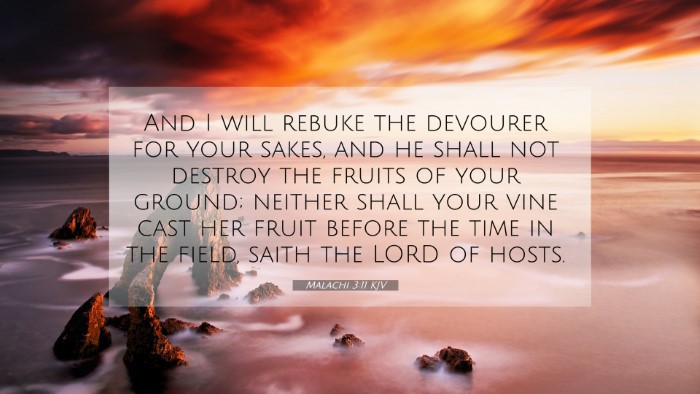Old Testament
Genesis Exodus Leviticus Numbers Deuteronomy Joshua Judges Ruth 1 Samuel 2 Samuel 1 Kings 2 Kings 1 Chronicles 2 Chronicles Ezra Nehemiah Esther Job Psalms Proverbs Ecclesiastes Song of Solomon Isaiah Jeremiah Lamentations Ezekiel Daniel Hosea Joel Amos Obadiah Jonah Micah Nahum Habakkuk Zephaniah Haggai Zechariah MalachiMalachi 3:11 Similar Verses
Malachi 3:11 Cross References
And I will rebuke the devourer for your sakes, and he shall not destroy the fruits of your ground; neither shall your vine cast her fruit before the time in the field, saith the LORD of hosts.
Uncover the Rich Themes and Topics of This Bible Verse
Listed below are the Bible themes associated with Malachi 3:11. We invite you to explore each theme to gain deeper insights into the Scriptures.
Malachi 3:11 Cross Reference Verses
This section features a detailed cross-reference designed to enrich your understanding of the Scriptures. Below, you will find carefully selected verses that echo the themes and teachings related to Malachi 3:11 KJV. Click on any image to explore detailed analyses of related Bible verses and uncover deeper theological insights.

Haggai 2:17 (KJV) »
I smote you with blasting and with mildew and with hail in all the labours of your hands; yet ye turned not to me, saith the LORD.
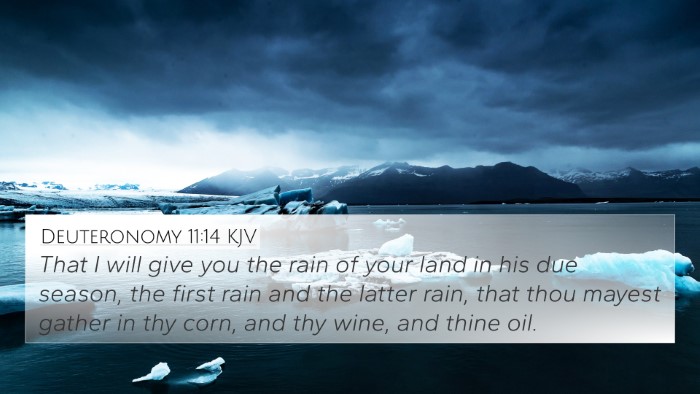
Deuteronomy 11:14 (KJV) »
That I will give you the rain of your land in his due season, the first rain and the latter rain, that thou mayest gather in thy corn, and thy wine, and thine oil.
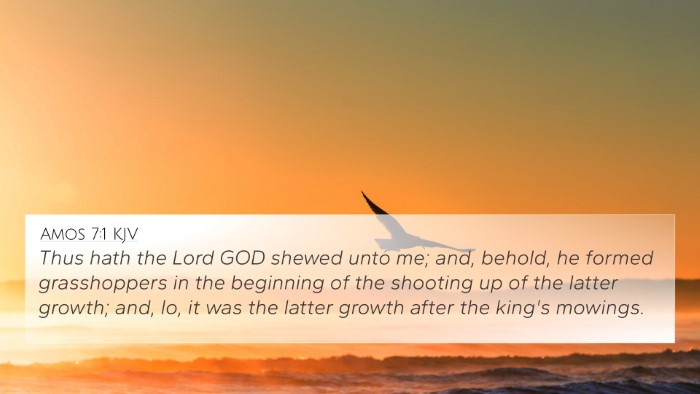
Amos 7:1 (KJV) »
Thus hath the Lord GOD shewed unto me; and, behold, he formed grasshoppers in the beginning of the shooting up of the latter growth; and, lo, it was the latter growth after the king's mowings.
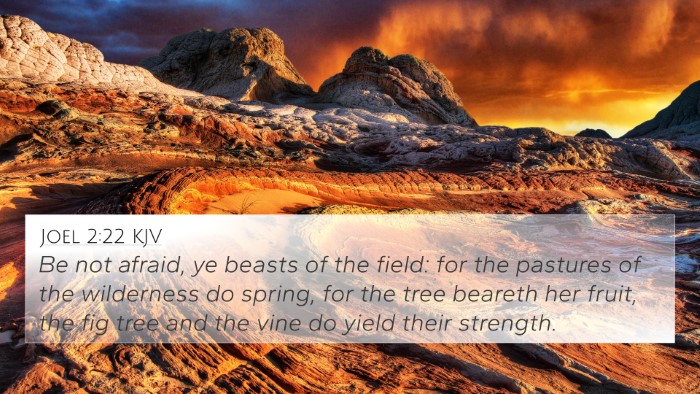
Joel 2:22 (KJV) »
Be not afraid, ye beasts of the field: for the pastures of the wilderness do spring, for the tree beareth her fruit, the fig tree and the vine do yield their strength.
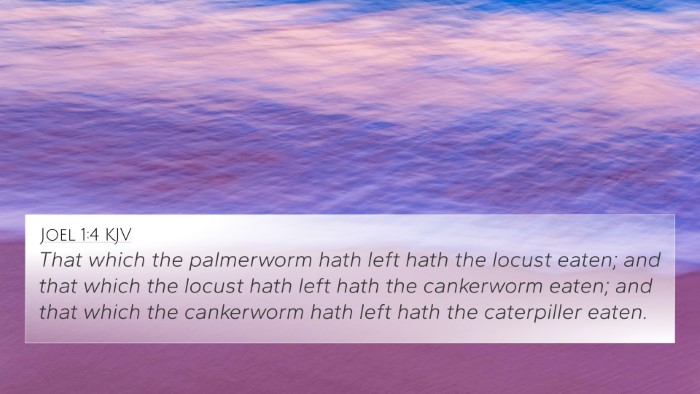
Joel 1:4 (KJV) »
That which the palmerworm hath left hath the locust eaten; and that which the locust hath left hath the cankerworm eaten; and that which the cankerworm hath left hath the caterpiller eaten.
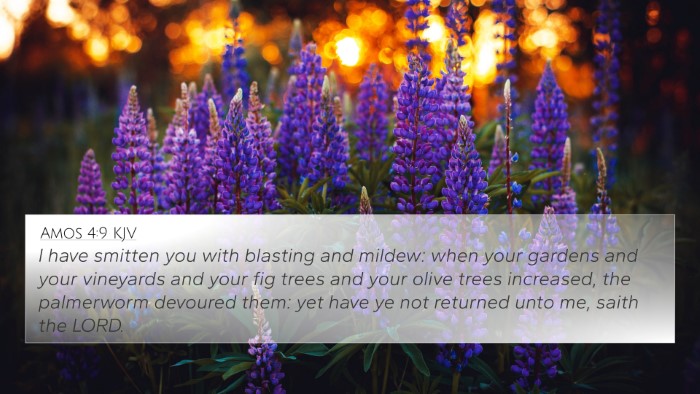
Amos 4:9 (KJV) »
I have smitten you with blasting and mildew: when your gardens and your vineyards and your fig trees and your olive trees increased, the palmerworm devoured them: yet have ye not returned unto me, saith the LORD.
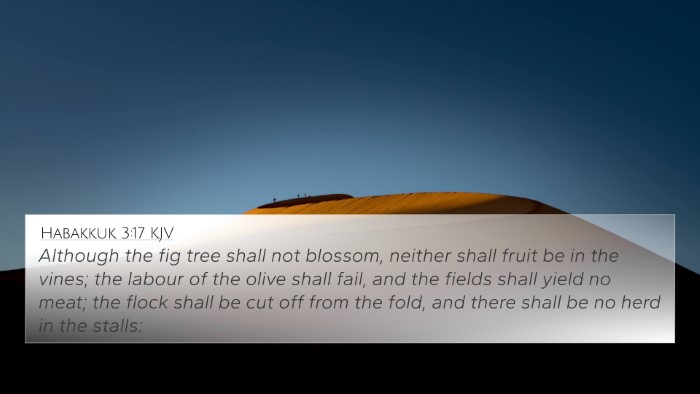
Habakkuk 3:17 (KJV) »
Although the fig tree shall not blossom, neither shall fruit be in the vines; the labour of the olive shall fail, and the fields shall yield no meat; the flock shall be cut off from the fold, and there shall be no herd in the stalls:
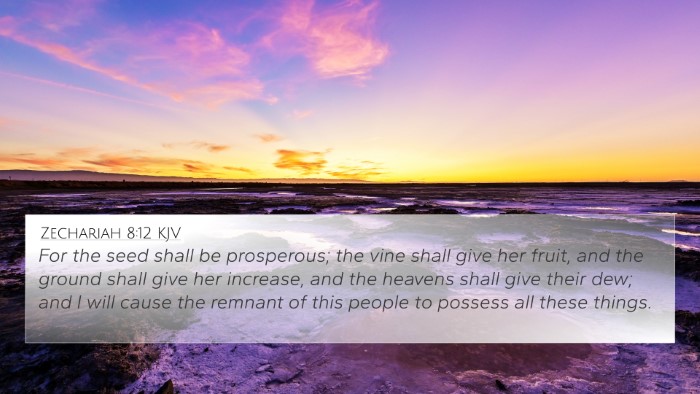
Zechariah 8:12 (KJV) »
For the seed shall be prosperous; the vine shall give her fruit, and the ground shall give her increase, and the heavens shall give their dew; and I will cause the remnant of this people to possess all these things.
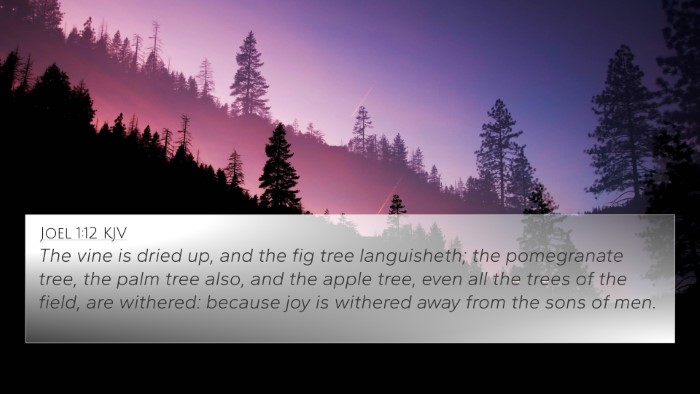
Joel 1:12 (KJV) »
The vine is dried up, and the fig tree languisheth; the pomegranate tree, the palm tree also, and the apple tree, even all the trees of the field, are withered: because joy is withered away from the sons of men.

Joel 2:20 (KJV) »
But I will remove far off from you the northern army, and will drive him into a land barren and desolate, with his face toward the east sea, and his hinder part toward the utmost sea, and his stink shall come up, and his ill savour shall come up, because he hath done great things.
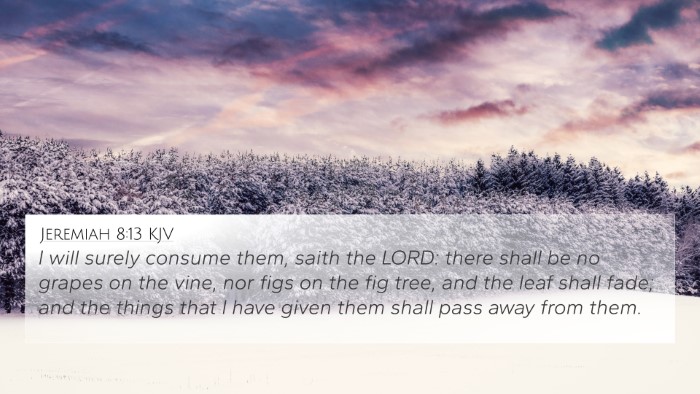
Jeremiah 8:13 (KJV) »
I will surely consume them, saith the LORD: there shall be no grapes on the vine, nor figs on the fig tree, and the leaf shall fade; and the things that I have given them shall pass away from them.

Joel 1:7 (KJV) »
He hath laid my vine waste, and barked my fig tree: he hath made it clean bare, and cast it away; the branches thereof are made white.
Malachi 3:11 Verse Analysis and Similar Verses
Understanding Malachi 3:11
Malachi 3:11 states: "And I will rebuke the devourer for your sakes, and he shall not destroy the fruits of your ground; neither shall your vine cast her fruit before the time in the field, saith the Lord of hosts."
Context and Background
The prophet Malachi addresses the people of Israel, who had begun to doubt God's love and providence. In this specific verse, God promises to bless those who bring their tithes and offerings to Him, assuring them that He will protect their resources and ensure abundance.
Significance of the Promises
According to Matthew Henry, this passage highlights God's commitment to His people, revealing that faithfulness in giving results in divine favor. Henry notes that the "devourer" symbolically represents any force that threatens the sustenance and prosperity of the believers.
Albert Barnes elaborates that the promise encompasses both spiritual and physical provisions. The "fruits of your ground" signifies not only material wealth but also spiritual growth, where God rebukes anything that would hinder the believers' development and harvests.
Adam Clarke emphasizes the historical context, indicating that agricultural failures were common threats in Israel. God’s promise to "rebuke the devourer" serves as a reassurance that trust in God leads to the preservation of both crops and livelihood.
Bible Verse Cross-References
- Deuteronomy 28:8 - God promises blessings on the produce of the land for obedience.
- Proverbs 3:9-10 - Honor the Lord with your wealth, and your barns will be filled.
- Joel 2:25 - God promises restoration of what the locusts have eaten.
- 2 Corinthians 9:6-8 - Generosity leads to plenty and God loves a cheerful giver.
- Luke 6:38 - The measure you use will be the measure you receive; highlighting reciprocity in giving.
- Malachi 3:10 - The verse directly preceding which encourages bringing the full tithe.
- Philippians 4:19 - God shall supply all your needs according to His riches in glory.
Thematic Bible Verse Connections
This verse provides connections throughout Scripture that illustrate God's desire to meet the needs of His faithful. For instance, the cross-referencing of Bible verses demonstrates a recurring theme of God's provision for those who respond to His call to generosity and faithfulness.
The connections between Bible verses show how the principle of tithing and giving is not only a commandment but also a means through which believers access God's abundant grace. Cross-referencing Biblical texts highlights interconnections that can bolster one’s faith and understanding of God’s promises.
Comparative Bible Verse Analysis
In analyzing Malachi 3:11 with other biblical promises, one can see a consistent encouragement toward the practice of tithing and a reciprocal relationship with God. For instance, comparing this verse with Proverbs 11:25, where a generous person will prosper, shows the direct benefits of being faithful stewards of what God has provided.
Moreover, the thematic correlations can be further explored in the New Testament, where Jesus’ teachings on giving reflect the same principles found in Malachi. This underscores the notion that God remains constant in His expectations and rewards.
Practical Application
Understanding this verse invites believers to consider their own giving practices. By reflecting on Malachi 3:11 and its surrounding context, one can find compelling reasons to engage in Bible cross-reference studies to enrich their understanding of scriptural promises.
Utilizing a Bible concordance or a Bible cross-reference guide can aid in identifying connections between the Old and New Testaments, enabling a deeper appreciation for the continuity within God’s message across centuries.
Conclusion
Malachi 3:11 is a powerful reminder of God's faithfulness towards those who honor Him through their stewardship. The exploration of this verse through cross-referencing establishes a robust framework for understanding God's commitments, encouraging believers to trust in His provision.
Further Study and Resources
For those interested in further examining Biblical themes, various Bible reference resources and Bible chain references can be invaluable. These tools help uncover the complex inter-Biblical dialogue that enriches scripture interpretation and application.


